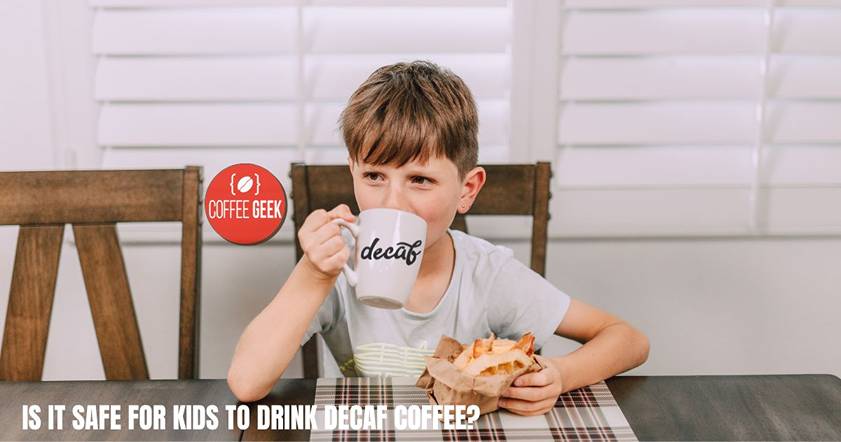Okay, folks, let’s get down to (coffee) grounds and spill the beans on a topic that’s undoubtedly percolating in many minds: can kids drink decaf coffee?
Yes, we’re going to serve up a hot cup of answers to this burning question. So, grab your cup of decaf and let’s brew some knowledge!
Can Kids Drink Decaf Coffee?
Simply put, when it comes to children and coffee consumption, it’s not exactly as black and white as your favorite cuppa. But let’s dive in and take a closer look.

Understanding Decaffeinated Coffee
First, let’s get to know your less-caffeinated companion better. Decaffeinated coffee, or universally known as the “party pooper coffee,” is just regular coffee that underwent a decaffeination process.
This process is basically coffee’s equivalent of a nap – it relaxes and takes the edge off coffee beans, reducing the caffeine content.
But remember, it still contains a small amount of caffeine, like the quiet whisperings of its pre-nap, caffeinated self.
Children and Caffeine Intake
Now, when it comes to kiddos’ caffeine intake, things get a little, well… jittery.
While we adults might boast about needing our daily five cups of coffee per day, caffeine content for recommended for children should be as minimal as possible.
“But they see their parents drinking coffee!”, you argue. True, but our immature little beans are not yet ready for the robust world of caffeine.

Decaf Coffee and Chemical Content
“But wait!”, we hear you exclaim, “could decaf coffee then be the answer?” Well, it’s crucial to remember that decaf coffee may have lowered caffeine but it comes with its own set of considerations.
Certain chemicals are used in the decaffeination process, and while they are safe for adult consumption, it might be a different story for children.
At What Age Can Children Start Drinking Decaf Coffee?
All right, let’s get to the tea– ahem, coffee– about age. When exactly is the ripe time for your young bean to have their first cup of decaf?
The Age of 12 and Decaf Coffee
Now, some experts might recommend that children start drinking coffee only around the age of 12, as a rough guideline.
This ‘java-judgment’ is based on most children’s overall maturity and gastrointestinal development.
But remember, it’s best to keep the intake minimal as decaf coffee has a small amount of caffeine.

Caffeine Intake and Children Under Age
For children under the age of 12, it’s generally suggested to stick to drinks without any caffeine content.
Basically, save the decaf coffee consumption and stick to milk, water, and fruit juice potions. Keep the caffeine wizardry for the adults!
How Much Decaf Coffee Can a Child Consume
So, if your child has crossed the age restriction line and is ready to savor their first sip of decaf coffee (under your watchful eye, of course), how much is too much?
Well, let the child’s taste, tolerance level and age decide.
However, even for these coffee-apprentices, a small amount of decaf coffee per day is plenty.
Difference Between Regular Coffee and Decaf Coffee
It’s time for an epic coffee showdown! Let’s explore the striking differences that separate these drinks.
The Decaffeination Process
As stated before, the decaffeination process is what separates the strong caffeinated coffee from the mild-mannered decaf.
It also means you get to enjoy the taste of coffee without inviting the jitters to the party.
Comparing The Coffee Taste: Regular and Decaf
When it comes to taste, there’s a bit of a stir.
While some coffee connoisseurs might argue that decaffeinated coffee is like a sitcom without a laugh track, many people find they enjoy the flavor just as much as regular coffee.
It all comes down to individual preference!
Beverage Caffeine Content: Decaf vs Regular Coffee
The biggest difference, of course, is the caffeine content of decaf and regular coffee. In essence, the type of coffee you choose depends on how much caffeine you’re inviting to your life party!
Benefits of Kids Drinking Decaf Coffee
There’s been a lot of talk about the risks, but let’s pour out the benefits too. Here’s how kids could benefit from sipping on a cup of decaf.
Health Benefits of Decaf Coffee for Children
Decaf coffee does hold health benefits for children, even if it’s not as caffeine-spiked as its brethren.
It has antioxidants, can soothe constipation (bonus for parents of constipated children), and introduces them to a new flavor palate.
Using Decaf Coffee Grounds for Children
Moreover, decaf grounds aren’t just for brewing, they can be used in craft projects too. Think painting, sculpting, and even gardening. So, it’s safe to say decaf coffee may just be the creative catalyst you and your child need!
Does Decaf Coffee Offers the Same Benefits as Regular Coffee?
Good news, folks! Many of the benefits of decaf coffee are similar to that of regular java, especially the antioxidant content, minus the caffeine kick, of course.
How to Safely Introduce Decaf Coffee to Your Child?
Ready to introduce your child to the magic of decaf coffee? Here are some tips to make sure you do it safely.
Tips for Introducing Decaf Coffee to Kids
Use small amounts initially and monitor for any adverse effects. Also, blend it with their favorite milk. It’s like coffee in kid-friendly disguise!
Potential Risks and How to Mitigate them
Introducing kids to decaf coffee comes with some potential risks, such as triggering caffeine dependence or disrupting sleep. An open dialog about these issues is a good first step in mitigation.
Choosing the Right Decaf Coffee for Your Child

Finally, make sure to choose a decaf coffee that uses a natural decaffeination process, to avoid extra chemicals. Like a true coffee connoisseur with a sippy cup – demand only the best for your little ones!
So, there you have it. The big reveal is made, the beans are ground, and the brew is bubbling.
Yes, kids can indeed drink decaf coffee, but as with any decision regarding our children’s health, it comes down to informed choice and moderation.
| Question | Answer |
|---|---|
| Can kids drink decaf coffee? | Depends on several factors |
| Age recommendation | Generally for kids aged 12 and above |
| Reasons for moderation | Caffeine sensitivity varies in children |
| Decaf coffee composition | Contains small amounts of caffeine |
| Health considerations | Check with pediatrician for individual cases |
| Nutritional benefits | Minimal; avoid as a substitute for water |
| Impact on sleep | Less likely to interfere compared to regular coffee |
| Parental supervision | Recommended, monitor intake |
Conclusion
Decaf coffee is often seen as a safer alternative for those who want to avoid the effects of caffeine in coffee.
However, when it comes to children and adolescents, the question of whether kids can drink decaf coffee is more complex.
Studies have shown that decaf coffee is still a form of coffee, and like its caffeinated counterpart, it is not recommended for kids.
This is primarily because even decaf coffee has some caffeine, and children are smaller than adults, making them more susceptible to the effects of caffeine.
It’s important to know that coffee, even decaf, can cause disturbances in sleep patterns, especially if consumed even 8 hours before bedtime.
Children require a high amount of sleep for healthy growth and development, typically around 10 to 12 hours of uninterrupted sleep each night.
Consuming decaf coffee regularly could potentially interfere with this crucial aspect of their health.
Additionally, coffee is acidic, which may not be ideal for a child’s developing digestive system.
While there might be an interest in trying coffee among some children, especially when they see adults or visit coffee shops, it’s not recommended for kids to start drinking coffee in small or large quantities.
The caffeine in coffee, though lower in decaf varieties, and the acidic nature of the drink are key reasons why giving them decaf isn’t generally advised.
If your child shows an interest in coffee, it’s crucial to talk to your children about the dangers and impacts of consuming coffee at a young age.
Letting a child have a few sips of decaf coffee shouldn’t be seen as making you a bad parent for offering it, but it’s essential to understand that regular consumption of even decaf coffee isn’t recommended for kids.
In summary, while children and adolescents may show curiosity about coffee, it is generally advised against allowing them to consume decaf coffee regularly.
Decaf coffee is still coffee, and children in this age group have different nutritional needs for their healthy growth and development.
A full cup of decaf coffee, or even sips of decaf coffee, should be approached with caution, considering the potential impacts on a child’s sleep and overall health.
FAQ
Can children start drinking coffee, specifically decaf?
Even though decaf coffee has very little caffeine, it’s not recommended to let children start drinking coffeine early.
The remaining caffeine from the coffee beans can still have some effects on a child. Most health professionals suggest waiting until at least age 12 before you give your child his or her first cup of decaf coffee.
How is decaf coffee made and can children drink it?
Decaf coffee is made by removing most of the caffeine from the coffee beans. But it’s important to note that decaf coffee still contains a small amount of caffeine.
As for children, it’s usually recommended that they avoid coffee and other caffeinated beverages, including decaf, at least until their teenage years.
What are the effects of kids drinking decaf coffee?
Even though decaf coffee contains very little caffeine, even the most potent coffee could be overstimulating for kids.
It could potentially disrupt their sleep or appetite. In general, there are healthier drink options you can offer your child than decaf coffee.
Do children under the age of 10 need to avoid coffee completely?
Yes, it’s generally recommended that children under the age of 10 avoid drinking coffee, including decaf. Their bodies might not be ready to handle any amount of coffee you give your child, even if it’s decaf.
Can my kid have a little bit of decaf coffee?
While a little bit of decaf coffee likely wouldn’t cause any serious issues, it’s usually better to err on the side of caution and limit children’s caffeine intake as much as possible.
Therefore, it’s advisable not to make a coffee drink, including decaf, a common part of a child’s diet.
How much caffeine does decaf coffee contain?
It’s important to note that decaf coffee is not completely free of caffeine. The decaffeination process can remove about 97% of caffeine, but some remains.
The exact caffeine content of decaf coffee can vary depending on the method used, but it’s usually much less than one cup of instant coffee or two cola cans.
Will my child love the taste of black coffee if they start drinking decaf?
That’s difficult to say. The taste of coffee is a beverage that many adults acquire over time. Some children may appreciate the taste of black coffee, but others may not.
But, decaf coffee tastes remarkably like regular coffee, so if they do enjoy it, they might enjoy regular coffee when they’re older.
Can drinking decaf coffee lead to a caffeine addiction in children?
Addiction from coffee is not a problem. However, it’s good to remember that decaf coffee still contains some caffeine.
Regular intake of caffeine, even in small amounts, could potentially lead to a dependence over time, although this is more common in adults.
Why is it suggested to limit the amount of coffee kids drink?
Kids are more sensitive to caffeine than adults and it could affect their nervous system and cause symptoms like jitteriness, nervousness, and upset stomach.
Even half a cup of coffee can have these effects on a child. Therefore, it is suggested that you limit the amount of coffee children drink.
Are there any health benefits for children drinking decaf coffee?
While it’s true that decaf contains antioxidants which offer some health benefits, these can also be obtained from a balanced diet of fruits, vegetables, whole grains and lean proteins.
Moreover, the potential side effects of caffeine, even in small quantity found in decaf, outweigh these benefits for children.

